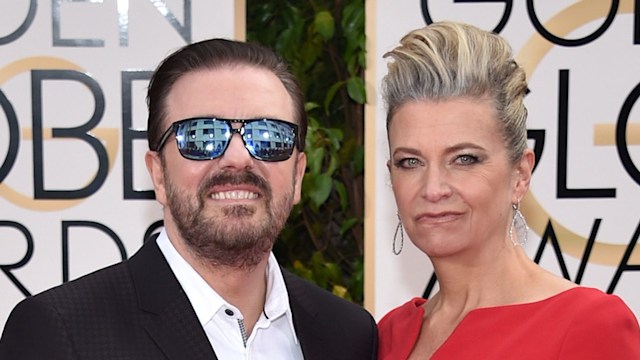Ricky Gervais' long-term partner Jane Fallon, 62, took to Twitter on Tuesday expressing her concern for a "growing" and "worrying" mark on her face.
The novelist posted a selfie with an arrow pointing to a small raised mark between her lips and nose. She wrote: "Goodbye 'thing on my face'. You tried to hide under a freckle, but now you’ve grown into something potentially more worrying, you have to go.
"Don't you dare leave a scar," Jane added, before expressing to a fan that despite her concern, she "wasn't worried" about her upcoming procedure.
Jane's followers were quick to offer their support. "You're doing the right thing! I had malignant melanoma in 2000 - a freckle on my back and had to have surgery to make sure they got everything. I'm sending positive vibes and good luck!" penned one fan.
Another wrote: "My Mum had loads of these suddenly grow on her face. They’ve all been removed. Minimal scarring," to which Jane replied: "I think getting older is just going to be an endless stream of things growing and being removed."
Other fans commented on how the author looked visibly upset in her photo, which she swiftly debunked as nothing more than seasonal allergies. "By the way, I have hay fever. I’m not getting upset. Not worried in the slightest," she added.
READ NEXT: King Charles makes risky decision ahead of 75th birthday
What are the first signs of skin cancer?
According to the NHS, skin cancer is the most common type of cancer. The first sign of non-melanoma skin cancer is usually the appearance of a lump or discoloured patch on the skin that persists after a few weeks and slowly progresses over months or sometimes years.
Basal cell carcinoma (BCC) usually appears as a small, shiny pink or pearly-white lump with a translucent or waxy appearance. It can also look like a red, scaly patch. It is rarely fatal, but it can be locally aggressive if not removed quickly. Basal cell carcinoma very rarely reaches an advanced stage, so chemotherapy is not usually needed as a form of treatment.
Melanoma skin cancer is a more aggressive form of skin cancer, but it can often be treated.
